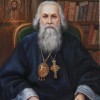 “To every thing there is a season, and a time to every purpose under heaven” (Ecc. 3:1)
“To every thing there is a season, and a time to every purpose under heaven” (Ecc. 3:1)
The holy apostle Paul, warning us not to spend time in vain, lawfully instructs us to use each minute of our life wisely: “See then, – he says, – that ye walk circumspectly, not as fools, but as wise, redeeming the time, because the days are evil.” In talking about “redeeming the time” the apostle makes us aware that time is used to purchase true blessings, just as money is used to acquire all that we need for physical life, and that, consequently, the proper use of time is very similar to the use of money in good hands. A wise master does not spend foolishly, totals up his assets properly, and assigns a special purpose to each sum of money. We should handle time in a like manner: assign hours and minutes for one or another good purpose; redeem each day by doing good deeds for ourselves or others; each year pass as many steps on the way to spiritual perfection as there are days in a year, and not waste a single hour needlessly, doing nothing, and least of all in using it for sinful deeds.
The day usually begins with our awakening from sleep. How should we look upon the moment of awakening? Just as we would look upon the moment of being born into the world or upon resurrection from the dead, because there is a great similarity between awakening from sleep and being born. When we are asleep, it is as though we do not exist. When we wake up from sleep, it is as though we are being born anew, we are coming alive, we are being resurrected.
The time immediately following sleep should, first of all, be spent in prayer. Each morning brings us the pious joy of glorifying God for the Creator’s having allowed us yet again to see His world, so beautifully designed for us. In beginning the day we are beginning a new life, and in life there are so many grounds for temptation and sin that a weak person absolutely cannot do without the help of God, which is acquired only through prayer. And secondly, time should be spent in reading the word of God: it is the book of life, it contains everything we need to know, to do, to hope for. In the words of St. John Chrysostome, it is God’s letter or epistle to mankind. Whoever does not nourish his soul with this celestial gift – starves his soul.
Afterwards comes the time for activity, time for work. Everyone has his own duties, his own affairs, his own job, his own diverse needs. But whatever they may be, there is one cardinal rule for all of them: “Be ye not unwise, but understanding what the will of the Lord is,” i.e. at the beginning of each deed ask your-self whether or not it conforms to the will of God.
How should we spend the time of leisure or rest? In fulfilling the following words of the apostle’s instruction: “Be filled with the Spirit, speaking to your-selves in psalms and hymns and spiritual songs, singing and making melody in your heart to the Lord.” That is, if you like to read in your free time – read that which reveals to you the wisdom of God. Do you like to go out in society? Do so, but keep to pious discussion, wise conversation, good counsels and discourses. Do you like singing and music? Do sing, but particularly those songs which contain the outpourings of pure and lofty souls. Worldly songs can sometimes corrupt the soul by glorifying passions, vices, and human folly.
In other words, do what you always do, but in reverse: exchange the sensual for the spiritual, the body for the soul, the secular for the religious.
Source: The Transfiguration of our Lord Russian Orthodox Church
















